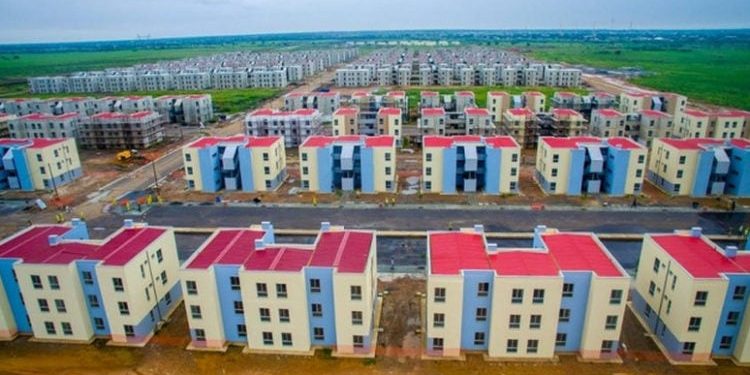The Saglemi Housing Project, initiated in 2012 under the National Democratic Congress (NDC) government, was envisioned as a solution to Ghana’s housing deficit, aiming to construct 5,000 housing units. However, recent developments have stirred controversy and opposition, particularly regarding the government’s proposal to partner with a private developer to revive the project.
Government’s Plan to Partner with a Private Developer
Minister for Works and Housing, Kojo Oppong Nkrumah, has announced plans to secure a private partner within five weeks to inject an estimated $100 million into the Saglemi Housing Project. This move is aimed at making the project habitable and operational. The decision reflects the government’s commitment to addressing the housing shortage in Ghana by leveraging private sector resources and expertise.
Opposition from the Minority in Ghana’s Parliament
Despite the government’s intentions, the Minority in Ghana’s Parliament has vehemently opposed the proposed partnership. Vincent Oppong Asamoah, the Ranking Member on the Works and Housing Committee, has raised concerns about the transparency and motives behind the government’s actions. He alleges that the government plans to offload the project to its allies and cronies, citing fears of corruption and cronyism.
Allegations of Cronyism and Corruption
Asamoah’s allegations highlight broader concerns about transparency and accountability in government projects. The accusation that the government intends to favor its supporters and insiders raises questions about fair competition and public trust. Such allegations can undermine confidence in the government’s ability to manage public resources effectively and ethically.
History and Background of the Saglemi Housing Project
The Saglemi Housing Project was conceived as a flagship initiative to address the housing needs of Ghanaians. However, it has faced numerous challenges since its inception, including delays, cost overruns, and allegations of mismanagement. The project’s troubled history has eroded public confidence and raised doubts about its feasibility and effectiveness.
Controversies Surrounding the Project
Controversy has dogged the Saglemi Housing Project from the outset, with allegations of fund misappropriation and irregularities casting a shadow over its progress. These controversies have fueled skepticism and skepticism among stakeholders, hindering efforts to revitalize the project and deliver on its promises.
Current State of the Project
The Saglemi Housing Project currently sits in limbo, with incomplete infrastructure and unresolved issues plaguing its future. The government’s proposal to engage a private developer represents a potential lifeline for the project but also raises concerns about transparency, accountability, and the equitable distribution of benefits.
Challenges Faced by the Government
The government faces significant challenges in revitalizing the Saglemi Housing Project and restoring public confidence. Addressing allegations of corruption and cronyism, ensuring transparency and accountability, and securing the necessary funding and expertise are key hurdles that must be overcome to move the project forward successfully.
Impact on Affordable Housing in Ghana
The fate of the Saglemi Housing Project has implications beyond its immediate scope, affecting the broader landscape of affordable housing in Ghana. The project’s success or failure will shape perceptions of government effectiveness, private sector involvement, and the feasibility of large-scale housing initiatives in the country.
Potential Solutions and Alternatives
To address the challenges facing the Saglemi Housing Project, stakeholders must explore innovative solutions and alternatives. This may include increased oversight and accountability measures, enhanced public-private partnerships, and greater community engagement to ensure that the project meets the needs and expectations of all stakeholders.
Public Perception and Trust Issues
Public perception and trust are critical factors in the success of the Saglemi Housing Project and similar initiatives. Rebuilding trust, fostering transparency, and demonstrating a commitment to accountability are essential for gaining public support and confidence in government-led projects.
Role of Transparency and Accountability
Transparency and accountability are fundamental principles that underpin effective governance and public service delivery. Embracing these principles in the management of the Saglemi Housing Project is essential for rebuilding trust, fostering confidence, and ensuring the project’s long-term success.
Conclusion
The Saglemi Housing Project stands at a crossroads, with the government’s proposal to partner with a private developer sparking controversy and opposition. Addressing allegations of corruption, ensuring transparency and accountability, and rebuilding public trust are essential for revitalizing the project and delivering on its promises of affordable housing for Ghanaians.
FAQs
- What led to the controversy surrounding the Saglemi Housing Project?
- How does the government plan to address allegations of corruption and cronyism?
- What are the potential implications of the proposed partnership with a private developer?
- How can stakeholders rebuild public trust in the Saglemi Housing Project?
- What role do transparency and accountability play in the revitalization of the project?








